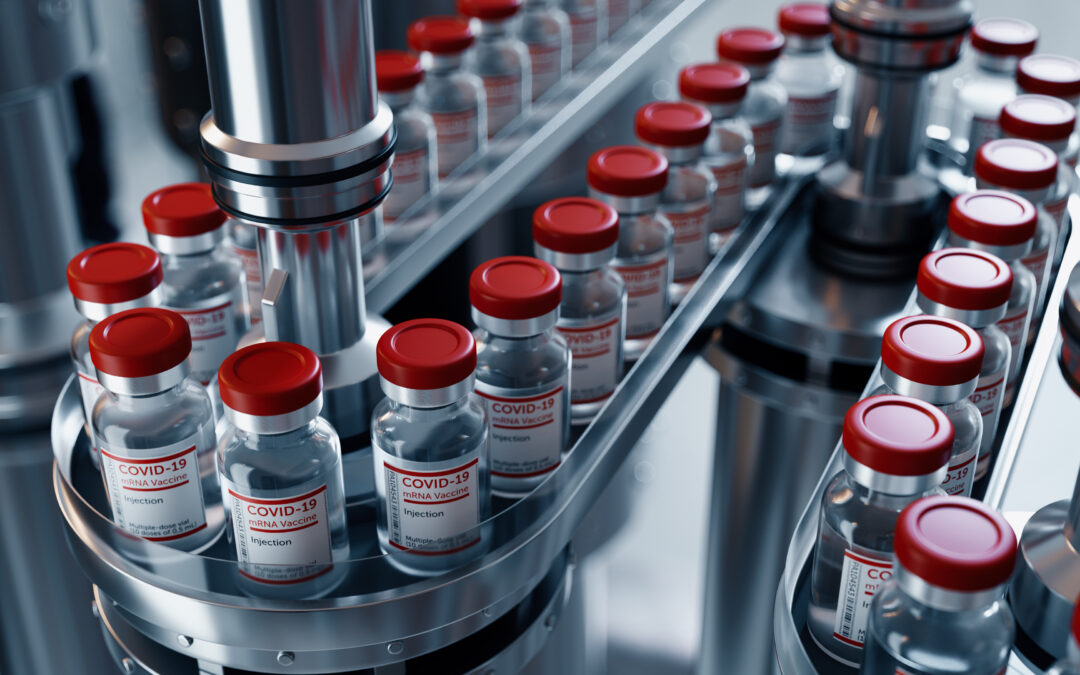[COVID 19 vaccine production. Photo: Katisa, 123RF]
In June 2022, United States President Joe Biden invoked the Defense Production Act to accelerate domestic manufacturing of clean energy, in particular the production of five key energy technologies: (1) solar; (2) transformers and electric grid components; (3) heat pumps; (4) insulation; and (5) electrolyzers, fuel cells, and platinum group metals. Senator Ed Markey – leader of the Green New Deal in the US Senate and a champion for using the Defence Production Act to support public health, renewable energy and climate protection – commended this action by President Biden saying that:
“President Biden’s decision to invoke the Defense Production Act to bolster the clean energy industry will make our country safer and more resilient for years to come. By investing in the clean energy that will power our nation’s future – from solar panels to heat pumps to clean energy technologies – the President is answering our call for immediate action to lower energy prices, fortify our independence from a corrupt global oil market, boost American manufacturing, create good-paying jobs, deliver a healthier environment, and build a more resilient economy. I will continue to fight alongside climate warriors from across the country and work with my colleagues in Congress to deliver the comprehensive climate justice and clean energy action we need to meet the magnitude of the climate crisis head-on.”
The Defense Production Act, initially adopted in 1950 but renewed and updated many times since then, provides executive authority to the US President to direct private companies to accept and prioritize contracts – including government contracts – for materials deemed necessary for national defense, regardless of a loss incurred on business.
Its original purpose was to ensure that during wartime, US industrial production was fully available to support the war effort. However, in recent decades the purpose has been expanded to include the possibility to use the act to address other national emergencies.
The Defense Production Act provides an important tool for the United States President to implement industrial conversion in order to address critical environmental and public health issues without having to receive congressional approval for each use of the Act.
President Clinton, for example, invoked the Defence Production Act in 1994 to improve national resource preparedness during natural disasters under the direction of the Federal Emergency Management Agency (FEMA). This authority has been renewed by successive Presidents.
President Obama invoked the Act in 2011 to force telecommunications companies, under criminal penalties, to provide detailed information to the Commerce Department’s Bureau of Industry and Security on the use of foreign-manufactured hardware and software in the companies’ networks, as part of efforts to combat cyber-espionage.
President Trump was initially critical of using the Defense Production Act for anything other than military production. However, he relented to pressure led in the Congress by Senator Markey, to invoke the act in order to support production of masks and other medical supplies necessary in the COVID pandemic, but continued to give priority to military production (See Despite Claims, Trump Rarely Uses Wartime Law in Battle Against Covid).
President Biden invoked the Defense Production Act on his second day in office (January 22, 2021) to increase production of supplies related to the pandemic such as protective equipment, and then again on March 2, 2021 to ensure supply of equipment for manufacture of vaccines.
Since then, President Biden has also invoked the in September 2021 to supplement the supply of fire-hoses which were required due to the high outbreak of wildfires, in March 2021 to increase the production of minerals necessary for the clean energy transition including for batteries for energy storage and electric vehicles, in May 2022 in response to the United States infant formula shortage and in June 2022 to accelerate domestic production of clean energy (as previously mentioned).
The importance of the Defense Production Act in implementing industrial conversion in order to address critical environmental and public health issues is becoming more recognized by progressive legislators and civil society organizations working on climate and public health issues.
This is true in particular regarding the Biden Administration’s climate agenda, many of the more ambitious elements of which faced congressional opposition even when the Democrats held both houses, and are likely to face even stronger opposition now that the Republicans control the House. (See Biden’s Climate Goals Rest on a 71-Year-Old Defense Law).
On public health issues, the Revolving Door Project, an advocacy group focusing on policies that the President could implement without approval of a deadlocked Congress, recently called on the President Biden to use the Defense Production Act to Rein In the Tripledemic of rising rates of COVID, respiratory syncytial virus (RSV) infection and the flu.
Military/industrial conversion action in Congress, such as the Invest in Cures Before Missiles (ICBM) Act introduced by Senator Markey, are still important in order to educate legislators and public on these issues and influence budgets – even if they are unable to be adopted. They can also help build political support and momentum for further use of the Defense Production Act to empower specific conversion action by US industry.

